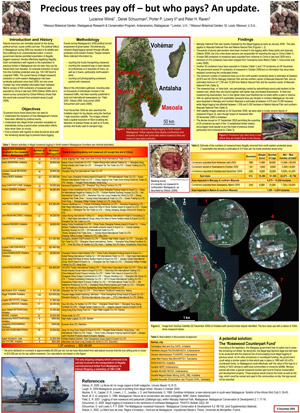While Madagascar’s current government has drawn sharp criticism from the international community for its failure to prevent the environmental destruction of recent months, France, Holland, Morocco, and the World Bank have all been implicated in financing illegal logging operations in Madagascar’s national parks over the past year. Even as foreign governments condemned the surge in illegal logging last year, many–either directly or through institutions they support–are shareholders in the very banks that have financed the export of illegal lumber from Madagascar’s SAVA region. The Bank of Africa Madagascar, for instance, is part owned by Proparco, a subsidiary of the Agence Française du Développement, as well as the World Bank’s International Finance Corporation, Dutch development bank FMO, and the Banque Marocaine du Commerce Extérieur. Société Générale and Crédit Lyonnais, both part-owned by the French government, have also provided loans to illegal timber traders.
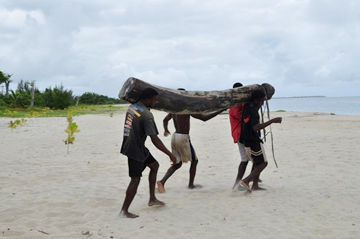 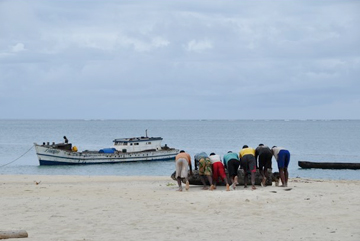 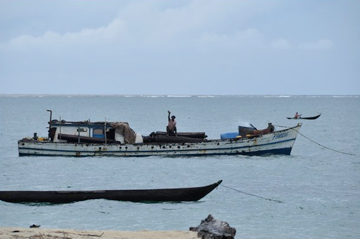 Rosewood logs being transported to a boat off a beach on the Masoala Peninsula. Photo taken in December 2009. |
The involvement of western governments and international institutions in illegal logging is all the more striking since the EU, France, the US, the World Bank, and IMF all suspended some level of financial support to Madagascar in the midst of the political crisis that swept former president Marc Ravalomanana from power last year. No foreign government recognizes the current administration of Andry Rajoelina, and aid was suspended in the name of restoring order and improving governance.
Now, it turns out that the investment dollars of those same governments–directly in the case of France, the Netherlands, and Morocco, and through contributions to the World Bank for the rest–are going to support illegal logging, an industry that relies heavily on corrupt governance at every level and which violates a number of Malagasy laws. The IFC and FMO each own more than 10% of shares in Bank of Africa Madagascar, while Proparco (a French government institution) and the Moroccan government each hold a stake in the wider Bank of Africa group, a 40% shareholder in Bank of Africa Madagascar. The French government also holds roughly 4% of Société Générale through the Caisse des Dépots and through its stake in the insurance company CNP. Crédit Lyonnais is a subsidiary of the majority public-owned Crédit Agricole.
Intensive logging of precious woods has occurred in the region’s protected areas throughout the past year, but timber traders have not been able to export rosewood reliably as soon as it is cut. Sporadic enforcement of Malagasy bans on exporting precious woods has compelled timber traders to stockpile large amounts of rosewood in depots awaiting export authorizations. “The value of these stockpiles is staggering,” writes Erik Patel, a biologist who does research in SAVA.
Down payments for illegal lumber exports are seldom more than 50% of final sale value, making cash flow a problem even in such a lucrative industry. With so much capital tied up in existing stock, timber traders have come to rely on banks to finance their exports and their ongoing logging operations.
Cargo manifests from regional ports indicate that Bank of Africa Madagascar has provided loans to 11 of 15 major timber traders, while BFV Société Générale, a subsidiary of Société Générale–one of the largest banks in the world–has provided loans to two of the largest timber traders. A report compiled last fall by the Environmental Investigation Agency and Global Witness at the request of the Malagasy government found that Bank of Africa Madagascar financed more than half of declared exports from the SAVA region in the first part of 2009, with Société Générale funding the balance. Crédit Lyonnais has been tied to more recent shipments.
Though timber traders have also relied on an informal network of Chinese importers in Madagascar for additional financing, these banks continue to abet illegal logging and timber trading without facing the same public outcry that has resulted in campaigns against shipping companies like Delmas, a company based in France that has been the most prominent transporter of rosewood over the past year. It is time for governments that denounce logging and other environmental destruction in Madagascar to take a more probing look at their own involvement.
Video: MADAGASCAR RAINFOREST MASSACRE
Related articles
Madagascar sanctions logging of national parks

(01/11/2010) Madagascar has legalized the export of rosewood logs, possibly ushering in renewed logging of the country’s embattled rainforest parks. The transitional authority led by president Andry Rajoelina, who seized power during a military coup last March, today released a decree that allows the export of rosewood logs harvested from the Indian Ocean island’s national parks. The move comes despite international outcry over the destruction of Madagascar’s rainforests for the rosewood trade. The acceleration of logging since the March coup has been accompanied by a rise in commercial bushmeat trafficking of endangered lemurs.
Madagascar’s Political Chaos Threatens Conservation Gains [Yale e360]

(01/04/2010) Only ten years ago, Madagascar was notorious for its environmental degradation and deforestation; astronauts orbiting the earth remarked that the red color of Madagascar’s rivers suggested the country was bleeding to death as its denuded mountainsides hemorrhaged topsoil into its waterways. But that began to change earlier this decade when President Mark Ravalomanana, working with international conservation organizations and local groups, set aside 10 percent of the country as parks and nurtured a thriving ecotourism business, all of which slowed deforestation and safeguarded more of the nation’s legendary biodiversity. The emergence of ecotourism helped make local people partners — rather than adversaries — in conservation. In short order, Madagascar went from being a pariah of the conservation world to a model. All of which makes the spasm of forest destruction that has swept the country since a coup last March even more tragic. In the absence of governance, organized gangs ransacked the island’s protected rainforests for biological treasures — including precious hardwoods and endangered lemurs — and frightened away tourists, who provide a critical economic incentive for conservation.
(12/17/2009) Delmas, a subsidiary of French shipping giant CMA-CGM, is facilitating the destruction of Madagascar’s endangered rainforests by providing transport for timber illegally logged from the country’s national parks, report multiple sources that have been investigating the illegal rosewood trade in the Indian Ocean island nation. The accusations put Delmas directly in conflict with the French government’s push at climate talks in Copenhagen to establish stronger safeguards against illegal logging.
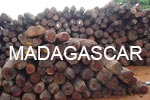
(12/16/2009) In the midst of cyclone season, a ‘dead’ period for tourism to Madagascar’s east coast, Vohémar, a sleepy town dominated by the vanilla trade, is abuzz. Vanilla prices have scarcely been lower, but the hotels are full and the port is busy. “This afternoon, it was like a 4 wheel drive show in front of the Direction Regionale des Eaux & Forets,” one source wrote in an email on November 29th: “Many new 4×4, latest model, new plane at the airport, Chinese everywhere.”
